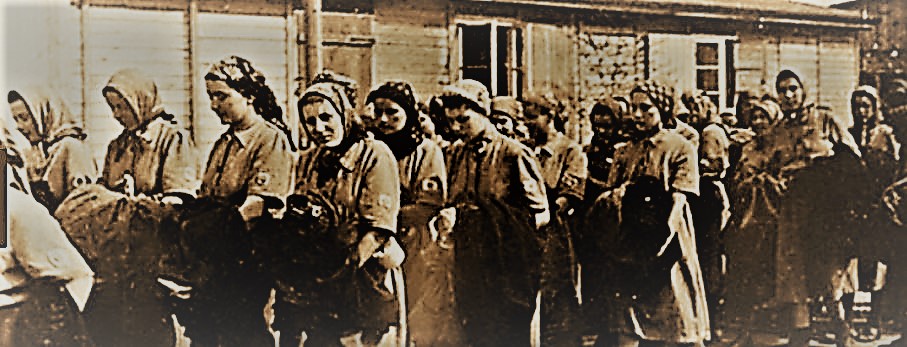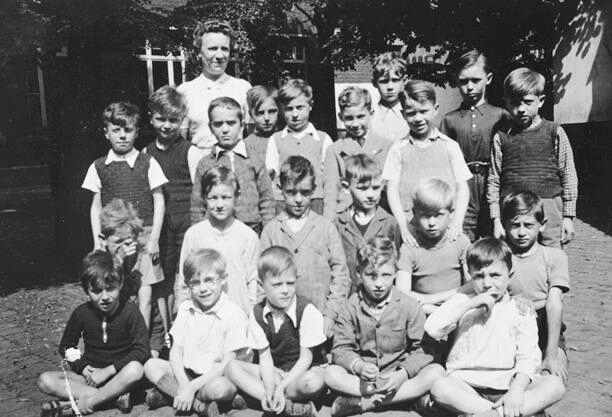
I know this is a controversial subject and I also know that many people will not even bother reading further than the title and the first line. They will have made up their minds without reading the full post. They will not realize that this post is just to highlight another crime committed by the Nazis, but one that is often forgotten.
Firstly let me explain how I got to the idea of writing this piece. It actually came about in a roundabout way. I was reading up on Willem van Otterloo a Dutch composer. I noticed he was the father of another Dutch composer, Rogier van Otterloo who composed several Eurovision song contest songs but also wrote quite a few film scores. One of his films is titled “Keetje Tippel.”
Keetje Tippel is the story of a Dutch prostitute in the 19th century. The story is based on the memoirs of Neel Doff an author of Dutch origin living and worked in Belgium and mainly wrote in French. She was one of the most important contributors to proletarian literature. On 14 July 1942, Neel Doff, embittered by the horrors of the war and suffering from kidney failure, died in her house, 16 rue de Naples in Ixelles, Belgium. In order to secure her estate she only left the author rights of her work to her dear friend Mrs Helen Temersen, who being Jewish saw her welfare and worldly belongings in peril.
This made me look into the subject of prostitution in the concentration camps, I had done a post on it before but I just wanted to explore this a bit more. For several decades the history of the concentration camp’s “special blocks,” where the Nazis forced female inmates to become prostitutes, was ignored. Why I don’t really know. Maybe because it was too much of a taboo subject.

Heinrich Himmler had ordered the creation of camp brothels in 1941. His logic was cold and calculated, male prisoners would work harder if offered the incentive of sex, and if only a few had this privilege it would crush solidarity.
Historian Robert Sommer wrote a book about the subject, titled “Das KZ Bordell” (The Concentration Camp Brothel).
From 1942 to 1945, female prisoners in a total of ten concentration camps had to perform forced sex labour. There was also a camp brothel in Neuengamme. Most of the women were forcibly recruited for this in Ravensbrück. How this happened is described by the Slovenian survivor Nada Verbic: “At morning roll call the room elder said: ‘Women with nice hair should report for the whorehouse.’ At first, I doubted that I had heard correctly. A toothless, bald Polish woman answered and said: ‘Take me, I’m better than anyone with hair.’ But she was unsuccessful, perhaps she wasn’t good at German. One of our comrades, who didn’t know what the word Puff meant, replied derisively to the room eldest: ‘Get in touch and you’ll know.'”
Sommer estimates around 200 women inmates in total were forced to work in the brothels, initially offering the prospect of escaping the brutality of the concentration camps.

Portrait of a woman with a cigarette in hand; Camp Neuengamme. One of the ladies from the Puff. Prisoners from women’s camps were given a choice: the gas chamber or the puff, where they were forced into prostitution.
“A large majority of those forced into prostitution in the concentration camps were branded socially undesirable or anti-social by the Nazis. But there were no Jewish women among them, nor were any male Jewish inmates ever admitted to the brothels,” according to Sommer.
Also excluded from the brothels were Soviet prisoners of war.
It remains one of the lesser-known aspects of Nazi terror that some of the concentration camps included brothels, and that female concentration camp prisoners were forced into prostitution. Robert Sommer has scoured archives and concentration camp memorial sites around the world and carried out numerous interviews with historical witnesses over the past nine years.
Austrian resistance fighter Antonia Bruha, who survived the Ravensbrück camp, reported years ago that, “the most beautiful women went to the SS brothel, the less beautiful ones to the soldiers’ brothel.
One man who tried to break this enduring silence is former Buchenwald prisoner Albert van Dijk, a Dutchman from the town of Kampen, close to the German border. He recalled in 2009
“Often I raised the subject of the ‘special block’ at meetings of former inmates of Buchenwald, but nobody ever wanted to discuss it or they said I was mistaken,” said Van Dijk.
He still vividly remembered how at the age of 18, among the despair and degradation of the camp, he fell for a blonde prostitute called Frieda and lost his virginity to her in the “special block”. Although prostitution was officially forbidden by the Nazis, the elite SS guards had set up a network of brothels catering to German soldiers, forced labourers and prisoners, which they intended in part to stamp out homosexuality. Lieselotte B., who was a prisoner at the Mittelbau-Dora camp said. “The main thing was to survive at all.”
I don’t think the taboo will ever be totally lifted but, by not addressing it, it would be an insult to those women and men who suffered as a result.
sources
https://www.jstor.org/stable/20753620
https://www.reuters.com/article/us-dutch-nazi-brothel-idUSL0144799320070710
https://www.dw.com/en/new-book-reveals-horrors-of-brothels-in-nazi-concentration-camps/a-4581173

Donation
I am passionate about my site and I know you all like reading my blogs. I have been doing this at no cost and will continue to do so. All I ask is for a voluntary donation of $2, however if you are not in a position to do so I can fully understand, maybe next time then. Thank you. To donate click on the credit/debit card icon of the card you will use. If you want to donate more then $2 just add a higher number in the box left from the PayPal link. Many thanks.
$2.00













You must be logged in to post a comment.